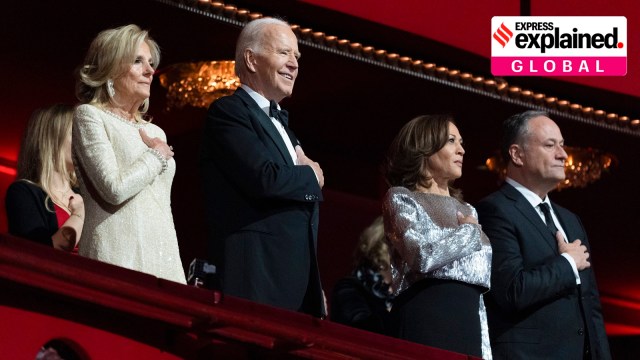After son Hunter, Joe Biden may ‘preemptively pardon’ allies: How this power of the US President works
What are the roots of the US President’s power to pardon? Are there any limits to this power? And what does Presidential pardon look like in India?
 US President Joe Biden, first lady Jill Biden, Vice President Kamala Harris and second gentleman Doug Emhoff at the John F. Kennedy Center for the Performing Arts in Washington, Sunday, Dec. 8, 2024. (Photo: AP)
US President Joe Biden, first lady Jill Biden, Vice President Kamala Harris and second gentleman Doug Emhoff at the John F. Kennedy Center for the Performing Arts in Washington, Sunday, Dec. 8, 2024. (Photo: AP)United States President Joe Biden has issued “A Full and Unconditional Pardon” for his son Hunter Biden, who was awaiting sentences in two cases related to tax evasion and lying about drug use while buying a handgun.
The word from Washington DC is that the President is now considering a series of ‘pre-emptive’ pardons for allies, including Vice-President Kamala Harris, former Chief Medical Officer Anthony Fauci, and Republican Congresswoman Liz Cheney. The idea is that a pardon would shield allies from arrest and prosecution when President-elect Donald Trump assumes office.
What are the roots of the President’s power to pardon? Are there any limits to this power? And what does Presidential pardon look like in India?
The US President’s power to pardon
Article 2, Section II, Clause 1 of the United States Constitution states that the President “shall have Power to grant Reprieves and Pardons for Offences against the United States, except in Cases of Impeachment”. Effectively, a pardon eliminates the punishment imposed following a conviction for an offence, though it does not overturn the conviction.
Colleen Shogan, former US archivist, in a 2020 report by the White House Historical Association wrote that the power to pardon has roots in English history and can be traced back to the reign of King Ine of Wessex in the seventh century, who exercised the “prerogative of mercy”.
The Cornell Legal Information Institute states that “prior to the American Revolution, the King’s pardon authority applied in the American colonies through delegation to colonial authorities. The English legal tradition of pardon then directly influenced the framers of the US Constitution following independence.”
In 1787 delegates from 12 of the original 13 states met in Philadelphia for a Constitutional Convention. During the Convention, Alexander Hamilton (one of the “founding fathers” of the United States) proposed the introduction of the Presidential power to pardon. A debate ensued regarding whether the US Senate should have the power to approve presidential pardons. An English jurist named William Blackstone expressed his belief that the power to judge and the power to pardon should not be held by the same authority. The power was granted to the President who is a part of the Executive branch, and was kept separate from both the legislative and judicial functions of the federal government.
The Office of the Pardon Attorney under the Department of Justice (DoJ) assists the President by processing thousands of petitions for pardons received annually. The process involves an initial review and an FBI background check before a final, non-binding recommendation is made to the President who will make a final decision. Though the President can grant a pardon at any point after a federal crime is committed, according to the DoJ’s rules regarding pardons, an individual can only apply for a pardon after she is released from confinement, following a five-year waiting period “to demonstrate an ability to lead a responsible, productive and law-abiding life”.
The limits of the US President’s power to pardon
Under Article 2 of the US Constitution, there are two express limitations on the power to pardon. The first is that the President can only pardon “Offences against the United States”, which refers to criminal offences under federal law (applicable in multiple states and investigated by federal agencies such as the FBI). The President cannot pardon an action that is an offence under the law of a specific state. The second limitation is that the President cannot grant pardons in cases of impeachment.
Another implied limitation under Article 2 is that a crime must first be committed for a President to then pardon it. However, once a federal crime is committed, the power to pardon could be exercised at any stage including before charges have been filed, as the SCOTUS ruled in the case of Ex Parte Garland (1866). The decision states that the power can be exercised ‘either before legal proceedings are taken, or during their pendency, or after conviction and judgment.”
According to the Office of the Pardon Attorney, a pardon “does not signify innocence” and “the pardoned offense would not be removed from your criminal record. Instead, both the federal conviction as well as the pardon would both appear on your record”. Also, though it may not be an indication of innocence, there is no clear answer on whether a pardon is an admission of guilt either.
‘Pre-emptive’ pardons
Can the President pardon someone to protect them ‘pre-emptively’ from future criminal prosecution? According to the Constitution Annotated — a government sanctioned record of constitutional interpretations — the Ex Parte Garland ruling reflects ‘that the President may not preemptively immunise future criminal conduct’.
While the President may not be able to ‘preemtively’ pardon crimes that are yet to be committed, according to Colleen Shogan it is possible for the President to ‘preemptively’ pardon an individual after a crime is committed but “before federal charges have been filed or a sentence has been imposed”, and it has been done before. She states, “Such was the case when (Henry) Ford pardoned (Richard) Nixon. There are other instances of presidents circumventing judicial processes in anticipation of legal action. Abraham Lincoln issued preemptive pardons during the Civil War and so did Jimmy Carter, who pardoned Vietnam draft evaders who had not been charged for their actions”.
When Ford pardoned Nixon following the latter’s resignation, it was broadly issued for any offenses he “has committed or may have committed”. Lincoln granted pardons to soldiers who left the Confederacy during the American Civil War as a tactic to encourage desertions.
The power to pardon in India
The President of India under Article 72 of the Constitution is empowered “to grant pardons, reprieves, respites or remissions of punishment or to suspend, remit or commute the sentence of any person convicted of any offence —
in all cases where the punishment or sentence is by a Court Martial;
in all cases where the punishment or sentence is for an offence against any law relating to a matter to which the executive power of the Union extends;
in all cases where the sentence is a sentence of death.”
The Supreme Court has weighed in on the President’s power to grant pardons. In Maru Ram v. Union of India (1980) for instance, a five-judge Constitution Bench held that the President cannot grant a pardon on her own and must act upon the advice of the Centre. It also held that the court would only hear a challenge to the exercise of power under Article 72 in the ‘rare’ situation where the decision is “wholly irrelevant, irrational, discriminatory or mala fide.”
- 01
- 02
- 03
- 04
- 05






































